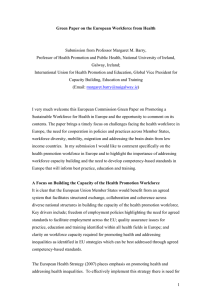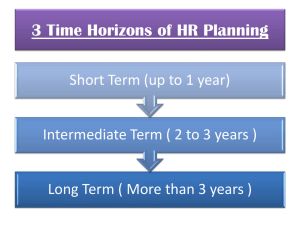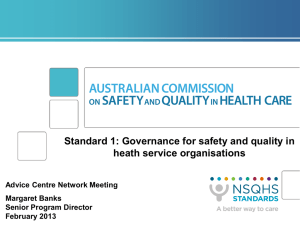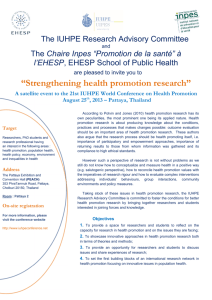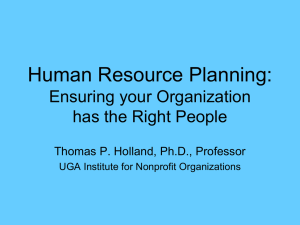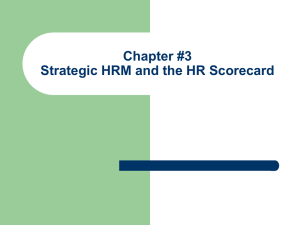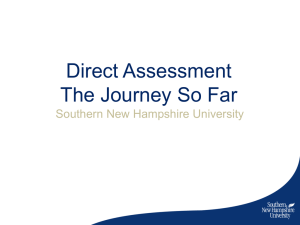Prof_Barry_PH_Programme_Information_Day
advertisement
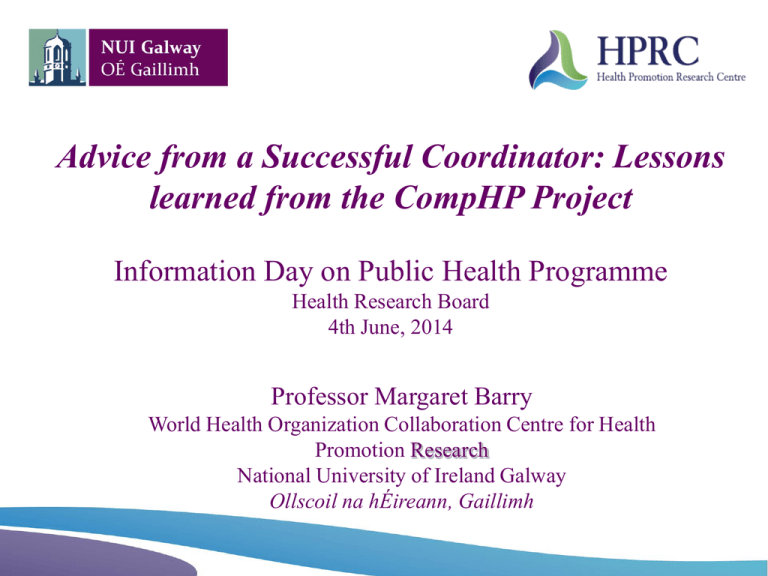
Advice from a Successful Coordinator: Lessons learned from the CompHP Project Information Day on Public Health Programme Health Research Board 4th June, 2014 Professor Margaret Barry World Health Organization Collaboration Centre for Health Promotion Research National University of Ireland Galway Ollscoil na hÉireann, Gaillimh Overview • Developing a strong and realistic proposal ‘the basis of a good project is good proposal’ • Managing the process of project development from submission through to delivery – the consortium, communication, budget, work allocation, timelines • Clear plan for project outputs – dissemination and translation • Plan for sustainability • Project Leader (20092012) • 24 Project Partners from across Europe academics, practitioners, professional associations and policymakers Lessons Learned “The basis of a good project is a good proposal” • Scientific and technical quality of the proposal o Clear rationale o Relevance - addressing a research or policy problem or gap in the literature/evidence o Innovative contribution – advancing the research area • Realistic – doable in the timeframe • European added-value – generate synergy Lessons Learned • Planning phase - allow time for detailed planning and proposal development • Methodology and Work Packages o Clear statement of project objectives o Methods to be used o Clear description of the individual work packages o Coherence and sequencing of the work o Delivery of project outputs Lessons Learned • Choose your partners carefully – – – – expertise of the consortium, geographical spread speak to the European context good working relationship capacity to deliver • Pay attention to budget details – advice from your institution and consult the Project Officer regarding what is and is not allowed – difficult to make changes afterwards • Check on all details before proposal submission Lessons Learned • The Project Leader/Coordinator has overall responsibility for the writing of the proposal and if succesful for the process of project development and delivery legal contract • Budget for a Project Manager • Strong research team – synergy in the consortium Aim of the CompHP Project • To develop a shared vision for health promotion workforce capacity building in Europe through establishing the core competencies, professional standards and accreditation mechanisms for quality assurance in the education, training and practice of health promotion Rationale • Strengthening Health Promotion workforce capacity for the implementation of population health improvement - competencies and standards for effective practice to deliver on global, European and national health policies - necessary knowledge, skills and abilities in translating policy, theory and research into effective action • Multi-skilled and flexible workforce - complex health challenges - addressing health inequities and the social determinants of health - Health in All Policies approach - citizen participation and empowerment • Distinctive contribution of Health Promotion to multidisciplinary Public Health European Context for the CompHP Project • • • Health Promotion is an evolving field of practice in Europe o diverse health promotion workforce - fragmented and lacking a clear occupational identity o varying levels of professional training and career development within and across countries Need for a coherent European approach o Freedom of employment across the EU region o Bologna Declaration and quality assurance in higher education in Europe (EAQAHE) o Quality assurance in practice and training in health fields o Public accountability o Workforce capacity required for delivering on EU health strategies Need for a comprehensive but flexible pan-European framework Research base for CompHP Project • • International literature on Health Promotion competencies, standards and accreditation • Australia, Canada, New Zealand, US and a number of European countries • Galway Consensus Conference Statement (Allegrante et al., 2009; Barry et al., 2009) - international collaboration to identify domains of core competency in health promotion - IUHPE, SOPHE, CDC IUHPE European Regional Sub-Committee research including: • Scoping study on Training, Accreditation and Professional Standards in Health Promotion (Santa-María Morales & Barry, 2007) • Pilot feasibility study on implementing a pan-European accreditation system (Battel-Kirk & Barry, 2009) Both reports accessible on www.iuhpe.org CompHP Project Objectives • To identify, agree and publish core competencies for Health Promotion practice, education and training in Europe • To develop and publish competency-based professional standards for Health Promotion practice • To promote quality assurance through the development of a Europe-wide accreditation system • To map competencies and standards in academic courses across Europe and link to accreditation for academic settings • To pilot competencies, standards and accreditation with practitioners in a range of settings across Europe • To engage in consultation with key stakeholders and disseminate information on the project outcomes throughout the 27 member states and candidate countries CompHP Process • Systematic and consensus-building approach - extensive and wide ranging consultation process - grounded in the core concepts and principles of Health Promotion • Mobilization of interest, dialogue and consensus concerning Health Promotion workforce development • Over 700 stakeholders from across the policy, practice and academic Health Promotion community in Europe were engaged in CompHP – 300 actively - Delphi technique with national experts across the EU region - online consultations with a broad base of practitioners - focus groups and workshops at country and pan-European level • International Expert Advisory Group Project Flow Chart CompHP Partners WP Title Organization People 1 Co-ordination of Project Health Promotion Research Centre National University of Ireland Galway (NUIG-IE) Leader: Prof Margaret Barry Administrator: Dr Vivienne Batt Co-ordinator: Ms Barbara Battel-Kirk 2 Dissemination International Union for Health Promotion and Education, France (IUHPE-FR) Leaders: Ms Sara Bensaude De Castro Freire & Dr Claire Blanchard Project Researcher: Ms Sara Debenedetti 3 Evaluation Universita di Perugia, Italy (UNIPG-IT) Leader: Prof Giancarlo Pocetta Project Researcher: Ms Erica Marie Pace 4 Developing Core Competencies National University of Ireland, Galway (NUIG-IE) Leader: Prof Margaret Barry Project Researcher: Ms Colette Dempsey 5 Developing Professional Standards Royal Society for Public Health, UK (RSPH-UK) Leader: Prof Richard Parish Project Researchers: Dr Viv Speller; Dr Heather Davison & Dr Anna Zilnyk 6 Developing Accreditation Framework The Netherlands Institute for Health Promotion (NIGZ), The Netherlands (NIGZ-NL) Leader: Mr Gerard Van der Zanden Project Researcher: Mrs Mariëlle Schipperen 7 Mapping in Academic Settings Universita di Cagliari, Italy (UNICA-IT) Leader: Prof Paolo Contu Project Researcher: Dr Alessandra Sotgiu 8 Mapping in Practice Settings Universidad Rey Juan Carlos, Spain (URJC-ES) Leader: Prof. Carmen Gallardo & Dr Ana Martínez Project Researchers: Ms Miriam Zaagsma & Ms Silvia Garcia de Sola Riera Associate Partners: Czech Republic, Institute of Public Health, (NIPH-CZ) - Dr Hana Janatova Estonia, University of Tartu (TU-EE) - Dr Anu Kasmel Finland, SOSTE Finnish Society for Social and Health, Finland - Ms Pirjo Koskinen-Ollongvist Ireland, Health Service Executive (HSE-IE) - Mr Brian Neeson Collaborating Partners • Department of Health Promotion and Disease Prevention, Malta • Association for Health Promotion in Ireland (AHPI), Ireland • Faculty of Health Education, Ankara University, Turkey • NHS Health Scotland • Israel Association of Health Education and Promotion • National Institute of Public Health, Croatia • The Dutch Association for Health Promotion, The Netherlands • Department of Health Promotion, University of Girona, Spain • ETC-PHHP Network c/o Cagliari University • School of Nursing and Midwifery, University of Brighton, UK • Department of Psychology, Université Catholique de Louvain, Belgium • Centre for Health Services Research, Department of Hygiene, Epidemiology and Medical Statistics, Athens University, Greece • Faculty of Teachers Training, University of Extremadura, Spain Collaborating Partners International Expert Advisory Group • Professor John P. ALLEGRANTE, Professor of Health Education, Department of Health and Behavior Studies, • • • • • • • • and Deputy Provost, Teachers College, Columbia University, USA; Co-Chair, Galway Consensus Conference on International Collaboration on Credentialing in Health Promotion and Health Education. Professor Hiram V. Acevedo ARROYO, Professor, Health Promotion and Health Education Graduate Program, School of Public Health, University of Puerto Rico. Director, WHO Collaborating Centre for Training and Research in Health Promotion and Health Education. Coordinator, Interamerican Consortium of Universities and Training Centers in Health Promotion and Health Education (CIUEPS). Dr Brian HYNDMAN, Senior Planner, Ontario Agency for Health Protection and Promotion; Fellow, Centre for Health Promotion, University of Toronto, Canada. Professor David V. McQUEEN, Global Consultant, formerly Associate Director for Global Health Promotion, US Centers for Disease Prevention and Control (CDC) (Retired, 2011); President of the International Union for Health Promotion and Education (IUHPE) from 2007 to 2010. Professor Hans ONYA, Director of Health Promotion, University of Limpopo, South Africa. Ms Helen RANCE, Senior Health Promotion Strategist, Health Promotion Forum of New Zealand Professor Mala RAO, Director, Institute of Public Health, Hyderabad, India. Professor Trevor SHILTON, Director of Cardiovascular Health, National Heart Foundation of Australia, Western Australia; Adjunct Associate Professor, University of Western Australian School of Population Health; Life Member of the Australian Health Promotion Association Professor Alyson TAUB, Professor Emerita of Health Education, Steinhardt School of Culture, Education and Human Development, New York University, USA. First Executive Director, National Commission for Health Education Credentialing (NCHEC), USA. CompHP Outputs • The CompHP Core Competencies for Health Promotion Handbook (Dempsey, Battel-Kirk and Barry, 2011) • The CompHP Professional Standards for Health Promotion Handbook (Speller, Parish, Davison and Zilnyk, 2012) • The CompHP Pan-European Accreditation Framework for Health Promotion Handbook (Van der Zanden, Battel-Kirk and Schipperen, 2012) Short versions available in English, French and Spanish • Series of reports on literature reviews, the development processes, and mapping and testing in academic and practice settings All available at http://www.iuhpe.org/index.php/en/comphp/1009-comphp-publications CompHP Project Handbooks Launched at the IUHPE 9th European Conference in Tallinn, Sept 2012 CompHP Impact • Testing of the system in both academic and practice settings - consultations and case studies completed at pan-European and country level • Testing implementation of the system at IUHPE European level • Impact of the CompHP Model – workforce development, training and education development • European wide and global interest in the CompHP products and processes CompHP Project Outcomes • Wide ranging consultation with practitioners, policymakers and education providers across Europe • Developed a shared understanding of, and consensus on, the core competencies required for Health Promotion practice, education and training in Europe • Publication of Handbooks on the CompHP Core Competencies Framework and Professional Standards for Health Promotion, which will inform capacity building for professional practice across Europe • Development of a pan-European Accreditation Framework for Health Promotion practitioners, and education and training providers CompHP Project Outcomes Which will lead to: • Enhanced education and training programmes in Health Promotion across Europe based on a shared understanding of the core competencies and standards that need to be incorporated into academic core curricula • The promotion of workforce development and best practice in Health Promotion through engaging practitioners and professional bodies in the development of quality standards and accreditation systems • Greater cooperation and coordination in Health Promotion practice, education and training across Europe, promoted by an active project consultation and wide ranging dissemination process improved quality of practice based on agreed competencies and standards Achievements • Mobilised interest and dialogue • Wide ranging consultation/engagement with 700+ stakeholders contacted and 300+ actively contributing to development process • Positive impact within and beyond Europe in policy, practice and academic settings, e.g. France, Germany, Italy, Ireland, Israel, Norway, UK; Australia, Canada, Latin America, New Zealand • Dissemination • • • • • All deliverables (20) submitted on schedule Publications – 3 Handbooks and 6 key reports published Themed issue of Health Education & Behavior Dec, 2012 Presentations at key conferences and through networks in Europe and globally Implementation and sustainability plan agreed • IUHPE Operating Grant – European Accreditation System • Global Working Group – Competencies and Workforce Development CompHP Websites English - http://www.iuhpe.org/index.php/en/comphp French - http://www.iuhpe.org/index.php/en/comphp Spanish - http://www.iuhpe.org/index.php/en/comphp For further information on CompHP development process and consultations: http://www.iuhpe.org/index.php/en/comphp Internal Factors impacting on Project’s success Systematic approach Competencies were developed on the basis of consensus and were available early in the project Policy and practice relevance Good work plan from outset Tight management Rapid responses from coordinators Good coordination and management of overall project Great communication Good involvement and relationship between work packages Strategic vision Tight management for development Perfect timing of the project Effective dissemination strategy Distributed work among many European countries High quality in process & outcomes Generated interest Dedicated and engaged partners Advice Have a project manager solely dedicated to this role Motivate partners towards a sense of commitment and ownership Build strong relationships among partners at early stages through meetings Lessons learned Ensure quality in process and outcomes Value the European dimension Plan to have tangible results in early phases Plan for Sustainability • Plan for taking forward the work at a strategic level – research, policy and practice • Galvanize action and leadership • Plan for translation and implementation - structures - resources - seeking endorsement and commitment to implementation
